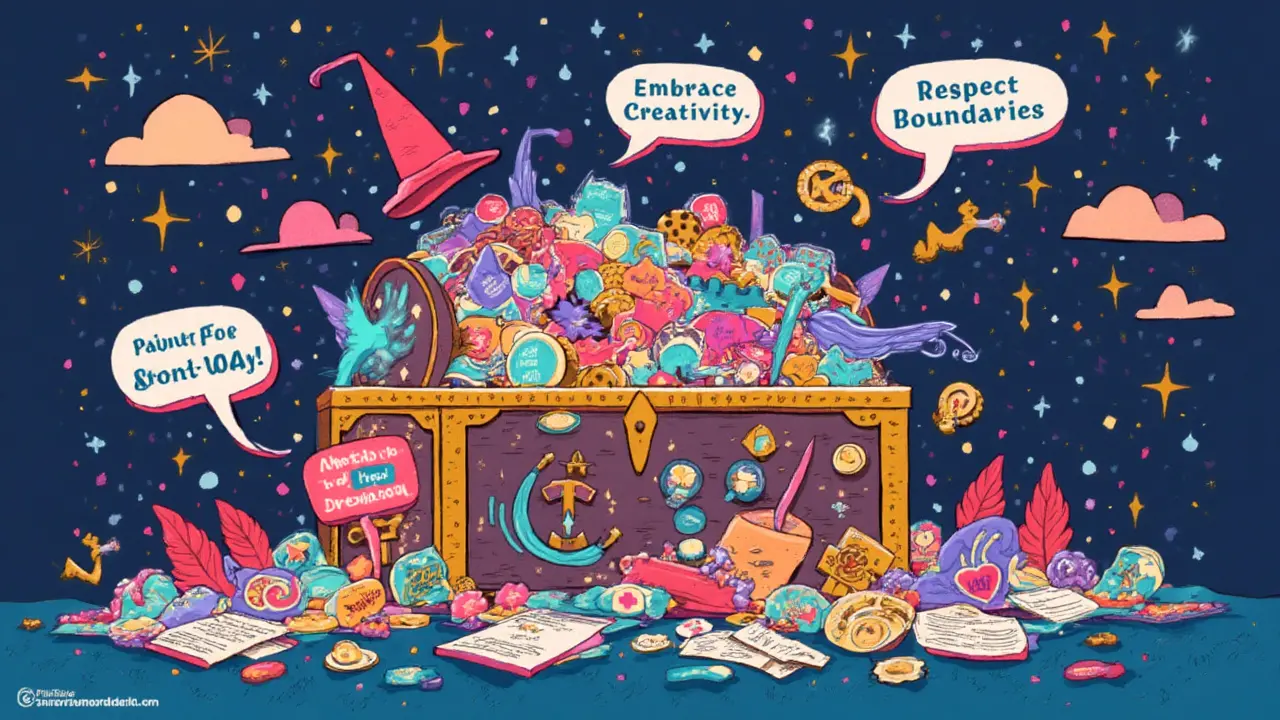Think about the last time you really let your imagination run wild. Were you a superhero saving the day? Secret agent? Maybe a villain plotting mischief, or just a regular person living out a hidden dream? Most folks spend plenty of their lives daydreaming about what-ifs, almosts, and if-onlys. But here's the real secret—there's nothing stopping you from living those stories, at least for a little while. That's where role-play comes in. The draw isn’t just about acting; it’s about shaking off routine, tapping into hidden parts of yourself, and connecting with someone else in a way that's as intense as it is fun. Role-play doesn't need Oscar-worthy acting skills or movie props. What it needs is a bit of daring, a dash of honesty, and someone willing to go along for the ride.
Why Role-Play is More Than Just Pretend
If you think role-play is only for movie sets or drama class, think again. Psychology Today points out that imagination is a powerful tool—it refreshes your mind, relieves stress, and helps couples break free from worn-out routines. Data from the Kinsey Institute shows that up to 65% of adults say they've fantasized about role-play or tried it with a partner at least once. People crave novelty and excitement, and fantasy play is a guilt-free, safe way to explore that with zero judgment. Have you ever wanted to test drive another identity—maybe be bolder, wilder, or just try a different side of yourself on for size? That’s what role-play is all about.
But it runs deeper. Role-play does more than just spice up sex lives (although, let’s be honest, it definitely does that). It can help you open up emotionally. Acting out scenarios creates a safe space where partners can express wants and needs they might not feel comfortable admitting in "real life". Picture this: you’ve always wanted to ask your partner for something a little off-the-wall, but you’re shy. In role-play, suddenly, you’re not "you"—you’re someone else. That distance can drop defenses, making it way easier to talk honestly. This isn’t just my opinion—a 2018 study out of the University of Montreal found that couples who role-played reported more frequent communication about boundaries, desires, and even everyday relationship issues.
Then there’s the trust factor. It might sound backwards, but putting yourself in a vulnerable, pretend scenario actually builds real trust between people. You have to depend on each other to stay "in character", respect limits, and keep things enjoyable. The payoff? You legit know you can count on each other, even after the scene ends. Even folks who don’t consider themselves “kinky” or “out there” can find that a little playful fantasy goes a long, long way in breaking old habits and strengthening relationships. You’ll be surprised at how much can change after shedding the weight of daily life, if only for an hour.

Getting Started: Role-Play Basics and Building Scenarios
So you’re ready to give it a try, but don’t know where to start? No worries. The good news—role-play is low pressure. You don’t need scripts, skills, or costumes (though props do up the fun factor). The first step: talk it over. I mean, actually talk. Ask your partner, “What would be fun to try?” or “What’s something you’ve always wanted to pretend, just for fun?” It’s about finding playful common ground, not forcing anyone to act out a cheesy movie scene they’ll hate.
Communication is the backbone here. Come up with a comfortable safe word or stop signal—think of it as a reset button. Always agree on limits up front. Some folks are into elaborate, months-long fantasies with texts and secret notes. Some just want to do a quick scene with a simple setup (“Tonight, you’re the boss, I’m the new hire”). Both work, as long as everyone’s in sync. The American Association of Sexuality Educators, Counselors and Therapists recommends starting small and building up confidence. Don’t be afraid to laugh at first—it takes a little while to settle into new roles, and that awkwardness is part of the fun.
Your scenario choices? Pretty much endless. Here’s what’s trending this year, according to a survey by the dating app Feeld:
- Authority games (teacher and student, cop and suspect, boss and intern)
- Classic fantasies (strangers meeting in a bar, royalty and servant, famous celebrity and adoring fan)
- Adventure and mystery (spy missions, detectives solving a case, pirates and captives)
- Supernatural themes (vampires, werewolves, superheroes)
- Light and silly fun (delivery person, masseuse, fortune-teller, or time travelers)
Want your scene to hit just right? Set the mood. Low light, sound effects from your phone, even a playlist can work wonders. If you like props, grab a few cheap accessories from a dollar store or use what’s already in your closet. Sometimes, all it takes is a hat or a pair of glasses to instantly transform a character. Don’t overthink wardrobe unless you want to go all-in. More important is attitude—be willing to commit to your part, even if you break character to laugh now and then.
Setting up the scene can be as simple as deciding who walks into a bar first, or as detailed as trading messages all day building anticipation. Plenty of folks find it easier to start with feet-on-the-ground roles—bartender, mechanic, librarian, neighbor—because the leap isn’t as big. Build up to more extravagant tales as you find your rhythm.
Here’s where things get unexpectedly real—role-play often exposes sides of yourself you didn’t expect. Leading a scenario if you’re usually quiet, or playing the shy character if you’re always the boss, is equal parts thrilling and eye-opening. The key tip: keep it playful, curious, and—above all—mutually enjoyable. If a scene feels off or awkward, switch it up or call it a win for trying new things. No pressure, no judgment, and no need to hammer on the same fantasy over and over. Variety is the secret sauce.

Keeping It Safe, Exciting and Rewarding: Advice and Real-World Wisdom
Believe it or not, safety and honesty are the shock absorbers of good role-play. Most mishaps happen when partners skip the talk about what’s okay and what’s a hard ‘no.’ Let’s face it, you don’t want to cause a real-life argument because you jumped into a scene without figuring out the rules first. Simple boundaries like, “No real names during the scene,” or “No rough play,” make everything else smoother. Psychologists advise using traffic-light systems—green for ‘all good’, yellow for ‘ease off a bit’, and red for ‘stop now.’
It's not just about sex, either. Plenty of people enjoy role-play for pure escape or comedy—think fake interviews, mock job auditions, or outrageous improv games. Sharing a laugh is one of the top intimacy boosters for couples, according to a 2023 survey by Match.com. So, it’s totally normal if your scenes turn out more funny than flirty. The research says what matters most is shared enjoyment, not sticking to a script or turning up the heat every single time.
Worried about what’s "normal"? There isn’t one. Some couples keep it casual, trying something new only once in a while. Others weave playful scenarios into their weekly routines. A little prep—like texting in character before you meet, picking a "set" (even if it’s just a cleaned-up bedroom), or having a costume ready—can help with nerves and set the mood. Want a confidence boost? Try starting with a storyline you both know, like reimagining a favorite movie scene or TV show—no need to invent everything from scratch.
If something feels awkward, turn it into part of the scene. Making a joke or pretending a character fumbles a line keeps things light. This isn’t live theatre, and there are no critics—just two people (or however many) having a good time. If embarrassment or self-doubt creeps in, remember that no one is watching or grading you. It’s just for you.
A lot of folks want to know if role-play is actually worth the effort. The data says yes. Look at this:
| Benefit | Percentage of People Reporting |
|---|---|
| Increased Relationship Satisfaction | 57% |
| Better Sexual Communication | 68% |
| Greater Trust with Partner | 53% |
| More Frequent Intimacy | 41% |
| Lower Anxiety about Desires | 35% |
Source: Intimacy & Play Survey, 2024
If you’re single or want to explore solo, role-playing with yourself is more common than you’d think. Writing stories, staging photo ‘missions,’ or even just taking on new identities online all count as imaginative play. It’s not just about romance, but getting comfortable expressing different facets of who you are.
Let’s be real—sometimes things flop. Maybe someone can’t stop laughing, maybe the fantasy didn’t land, or maybe props fell apart. The worst thing you can do is take it personally. The best thing? Enjoy the blooper reel, chalk it up to experience, and try again or move on to something different.
Here’s my go-to cheat sheet for lasting, healthy role-play habits:
- Check in afterwards—a quick “How did that feel for you?” keeps things open.
- Don’t do anything you’d regret in real life. Fantasy is for fun, not for lasting consequences.
- Switch it up. Variety keeps things fresh, even just changing setting, outfits, or who leads.
- Respect the reset. If someone calls time out or just isn’t into it—no pressure, no grudges.
- Celebrate wins, big or small. Got through your first try? Nailed the accent? High five each other.
Imagination isn’t just for kids or creative types—everyone’s got a fantasy they want to play out, even if it’s just being heard and understood. Role-play gives you an outlet for that, all in the safety of your own space. Bring an open mind, a sense of humor, and your wildest ideas. The only question is: what do you want to try next?





